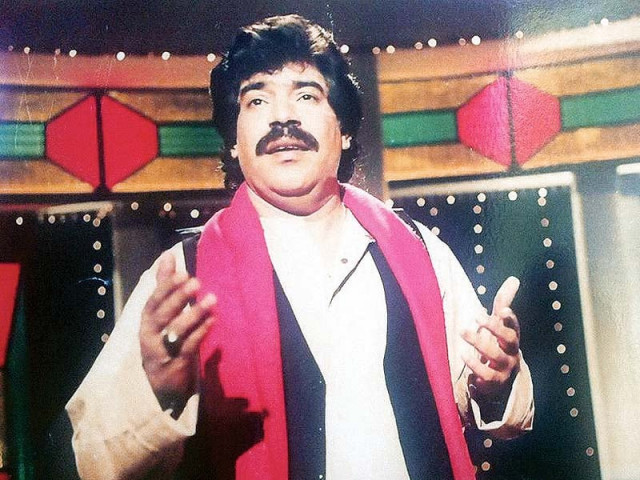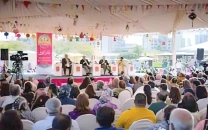Marching on matching bullets with baritone
Folk singer Shaukat Ali remembers recording 1965 war song ‘Jaag Utha Hai’ like yesterday

Born in a family of artists in Malkwal in 1940, Shaukat’s career spans over decades. PHOTO: PUBLICITY
“The paths of glory lead but to the grave.” Thomas Gray inked this line back in 1751. After almost 200 years came Faiz Ahmed Faiz with an answer, “Jis dhaj se koi maqtal mein gaya, wo shaan salamat rehti hai” [what matters is the grace with which one steps into the battlefield].
Seems this is exactly what the Pakistani soldier had in mind when he was in the battlefield of the 1965 war. Be it the Graveyard of Tanks in Chawinda, or the hostile fronts of Khemkaran, with guns blazing on both sides, the soldiers had another potent weapon to their disposal – speakers blaring with patriotic songs that were to become anthems embodying the Pakistani spirit.
Jaag Utha Hai Sara Watan was amongst the most popular chants; our very own equivalent of the Colonel Bogey March. The voice behind the composition, Shaukat Ali Khan remembers the war like yesterday. “I cannot forget the 1965 war. I recorded the song with Radio Pakistan and it clicked with the people instantly. There was a scare of an airstrike on these installations; even that couldn’t keep us from our mission. I saw the people of Lahore marching to Wagah with sticks and stones in their hands, humming the track, to defend their motherland against the advancing Indian forces,” he tells The Express Tribune. The renowned singer, whose name is synonymous with Punjabi folk music, says the motivation to contribute to the national cause through music transcended monetary benefits.
Read: Going green with the chaand sitare
Jaag Utha Hai Sara Watan was part of the 1965 film, Mujahid. With the battle simmering at the borders, Khalil Ahmad wove Hamayat Ali Shair’s lyrics into a composition that is remembered till today.
The mission that started off at Radio Pakistan saw no end. Shaukat continued to belt out hits after hits. The next time Pakistani and Indian troops were battling it out in 1971, Shaukat was again present at the studio; this time with his track Ae Dushman-e-Deen Tu Ne Kis Qaum Ko Lalkara Hai.
Shaukat has no qualms about the brand of patriotism that he got associated with. Born in a family of artists in Malkwal in 1940, his career spans over decades wherein he not only mastered folk singing but also ventured into ghazal and film music. He maintains, “We fought alongside our soldiers with all we had. We did our best to boost the morale of the people.” All three of my sons are associated with music. All I tell them is that whenever our country needs them, I want to see them amongst the first volunteers, he adds.

An old man now, Shaukat says September 6 still gives him an adrenaline rush. “Every passing day reminded me of our zeal back then. I made a lot of music but the war effort brought me centre stage.”
Only a few years after his war efforts, he was standing on Indian soil in 1982 at the Asian Games in New Delhi for a special performance. A recipient of numerous accolades, Shaukat says, “Whenever I or my sons are invited for a performance, we have made it a habit to open our set list with patriotic songs. The world should know that we are Pakistanis.”
Shaukat feels the passion might have toned down over the years; Pakistan may have been able to successfully defend its borders in 1965, today it is losing the battle of cultural infiltration. “India is trying hard to promote its culture. We have not been able to match its propaganda.” Drawing parallels between the treatment of art forms and artists in the two countries, Shaukat says the Indian government set up institutions for the promotion of music while in Pakistan, little attention was paid. “For the last 60 years I have been associated with music. The youth of today is inclined towards Western music. They have begun to reject our classical and folk roots.” The singer may have begun to lose hope for the art form’s cause, the passion of 1965 still compels him to note that our music will rise once again.
Published in The Express Tribune, September 6th, 2015.
Like Life & Style on Facebook, follow @ETLifeandStyle on Twitter for the latest in fashion, gossip and entertainment.



















COMMENTS
Comments are moderated and generally will be posted if they are on-topic and not abusive.
For more information, please see our Comments FAQ